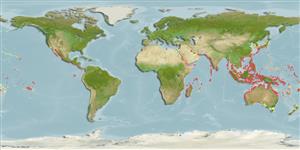Teleostei (teleosts) >
Kurtiformes (Nurseryfishes, cardinalfishes.) >
Apogonidae (Cardinalfishes) > Apogoninae
Eponymy: Captain James Cook (1728–1779) was one of the most famed explorers of all time, so there are many biographies to consult. [...] (Ref. 128868), visit book page.
More on author: Macleay.
Environment: milieu / climate zone / depth range / distribution range
Ecology
Marine; reef-associated; depth range 1 - 10 m (Ref. 90102). Tropical
Indo-Pacific: Red Sea and the Gulf of Oman south to Natal and east to the western Pacific where it ranges from Japan to the Great Barrier Reef and New Caledonia. Recently reported from Tonga (Ref. 53797). Also reported from Persian Gulf (Ref. 68964).
Size / Weight / Age
Maturity: Lm ? range ? - ? cm
Max length : 10.0 cm TL male/unsexed; (Ref. 2334)
Dorsal spines (total): 7; Dorsal soft rays (total): 9; Anal spines: 2; Anal soft rays: 8. Distinguished by having the following characteristics: Dorsal-fin rays VII-I, 9; anal-fin rays II, 8; pectoral-fin rays 14; pelvic-fin rays I,5; pored lateral line scales 24; predorsal scales 3-4; circumpeduncular scales 12; total gill rakers 18-20, developed rakers 12-13 (Ref. 93839). Whitish with 5-6 stripes (dark brown to yellowish), the stripe originating at the upper rear corner of eye incomplete; midlateral stripe ending in a distinct black spot at caudal fin base (Ref. 2334). Further characterized by presence of dark spot at middle of caudal fin base merged with midlateral stripe; greatest depth of body 2.5-2.8 in SL (Ref. 90102).
Found close to ledges of rocky areas or coral reefs during the day (Ref. 559). Subtidal zone to depths of about 10 m (Ref. 48635). Nocturnal species (Ref. 7300). Solitary or in small groups (Ref 90102).
Life cycle and mating behavior
Maturity | Reproduction | Spawning | Eggs | Fecundity | Larvae
Mouthbrooders (Ref. 240). Distinct pairing during courtship and spawning (Ref. 205).
Randall, J.E., G.R. Allen and R.C. Steene, 1990. Fishes of the Great Barrier Reef and Coral Sea. University of Hawaii Press, Honolulu, Hawaii. 506 p. (Ref. 2334)
IUCN Red List Status (Ref. 130435: Version 2024-1)
Threat to humans
Harmless
Human uses
Fisheries: of no interest
Tools
Special reports
Download XML
Internet sources
Estimates based on models
Preferred temperature (Ref.
123201): 23.2 - 29.3, mean 28.2 °C (based on 3572 cells).
Phylogenetic diversity index (Ref.
82804): PD
50 = 0.5000 [Uniqueness, from 0.5 = low to 2.0 = high].
Bayesian length-weight: a=0.01380 (0.00674 - 0.02829), b=3.09 (2.92 - 3.26), in cm total length, based on LWR estimates for this species & Genus-body shape (Ref.
93245).
Trophic level (Ref.
69278): 3.5 ±0.4 se; based on diet studies.
Resilience (Ref.
120179): High, minimum population doubling time less than 15 months (Preliminary K or Fecundity.).
Fishing Vulnerability (Ref.
59153): Low vulnerability (10 of 100).
Nutrients (Ref.
124155): Calcium = 154 [77, 258] mg/100g; Iron = 1.01 [0.56, 1.76] mg/100g; Protein = 18.7 [17.5, 19.9] %; Omega3 = 0.115 [0.063, 0.207] g/100g; Selenium = 25.4 [12.7, 51.3] μg/100g; VitaminA = 58.6 [17.3, 199.6] μg/100g; Zinc = 1.8 [1.1, 2.7] mg/100g (wet weight);
